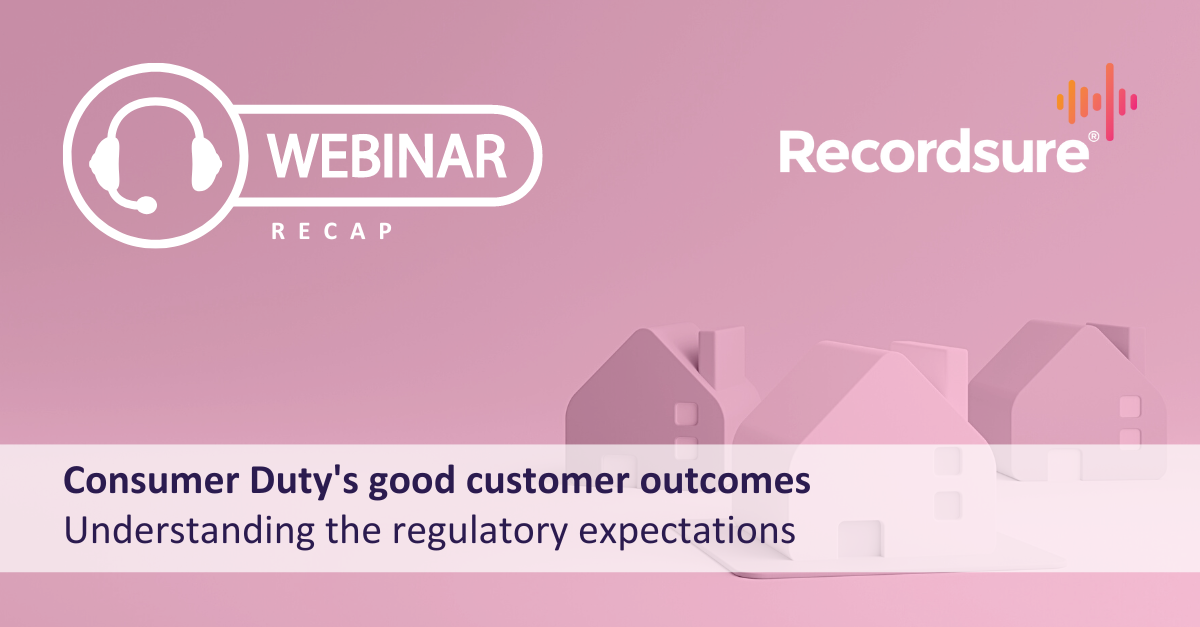On 16th November, our resident compliance experts hosted the second in our three-part series of webinars centred around the FCA’s Consumer Duty initiative.
In part one, we took a whistle-stop tour of exactly why the Consumer Duty is as important as advertised and the host of challenges awaiting firms on the road to compliance.
For the follow-up, we delved deeper into why the new rules shouldn’t be mistaken for just ‘Treating Customers Fairly (TCF) on steroids’ and why firms can’t afford to be caught asleep at the wheel with keeping up their end of the bargain.
The host, Recordsure’s Chief Product Officer Garry Evans, was joined by Ex-FCA and now Senior Product Manager at Recordsure, Olivia Fahy, and TCC’s Associate Director Neil Dethick. Our panellists answered the questions on everyone’s mind: how will the new standards be monitored and enforced?
So, what did we learn during round two?
Point 1: The FCA is serious about demanding more from firms
By requiring firms to clearly show how they’ll be implementing the Consumer Duty, the FCA signalled right out of the gate that it’s expecting firms to buy into the initiative and deliver on the promises it makes to customers. In fact, the regulator has already asked several firms to present their Implementation Plans for scrutiny over the coming weeks. So, it’s clear these aren’t just a tick box exercise – businesses will be monitored on their progress over the coming months.
With this in mind, everyone within the organisation should now be aware of the Consumer Duty and be on the same page about their direction of travel. Staff should be made aware of the main changes to processes and policies that will be taking place between now and July 2023, with working groups busy drilling down into the detail of what, when and how actions will be taken to align with the rules.
In terms of supervision, the FCA is taking a portfolio approach where firms will be grouped according to sector and business model. It will then draw up a bespoke, outcomes-focused strategy for each grouping to address their different risk profiles.
All is well and good so far – but how will the FCA actually verify the standards are being met?
Of course, the challenge here is that there won’t be any assigned test you can wait to be examined on or prepare for ahead of time. Instead, every touchpoint with the regulator will feed into Consumer Duty compliance, and so it’ll require constant effort and diligence across all aspects of the business.
Point 2: This isn’t a ‘boy who cried enforcement’ situation
Despite all the fanfare, it’s been noted that there doesn’t seem to be a sense of urgency to prepare for the legislation among many organisations. And this largely stems from a feeling that, tough talk aside, the FCA won’t actually take steps to police it once it’s underway – as happened with the previous TCF regime.
But the key difference that bears repeating is that TCF was mainly principles-based guidance, whilst the Consumer Duty is a full regulatory overhaul made up of hard and fast rules. It’s a fundamentally different beast, and the FCA has repeatedly said firms will not be getting away with a slap on the wrist this time around.
It’s also true that the FCA itself has come under scrutiny in recent years for not being proactive enough. This has led some commentators to see the Consumer Duty as partly an attempt to reboot its image and do good on its word to be more interventionist. So, what’s the key message for firms?
For starters, the Consumer Principle, Four Outcomes and Cross-Cutting Rules are non-negotiable and serious breaches will be met with penalties – either via interventionist powers, fines or remediation. For lesser offences, supervisory enforcement or increased regulatory scrutiny – for example, Section 166 investigations – are also on the table, and the reputational and financial risk of these shouldn’t be underestimated.
On a final common-sense note, the FCA simply can’t afford to let a culture of apathy take root within financial services – and so all signs point to the regulator coming down hard on firms who don’t get with the programme.
Point 3: Data collection is your ticket to sustainable improvements
It’s flown under the radar a bit, but the FCA has confirmed it’s looking for firms to have a workable data strategy within their Consumer Duty game plan. It’s also revealed that any new firms looking to be authorised will need to factor in data usage, and how that relates to evidencing, as part of their compliance framework.
It’s also important to point out that the Consumer Duty is here for the long haul, and so firms should be taking a long-term lens to these issues. What do we mean by this?
For one thing, it means focusing less on the 31st July deadline that’s understandably taking up the lion’s share of discussion at the moment, and more on how data can help drive best practice, Duty compliance and lay the groundwork for a customer-first culture in the years to come.
In other words, the implementation date isn’t the finish line, it’s a starting line – and so you should approach the data question with an eye on driving sustained positive change for the future.
Need help delivering your Consumer Duty compliance monitoring and evidencing? Looking to better your data strategy? Get in touch!





